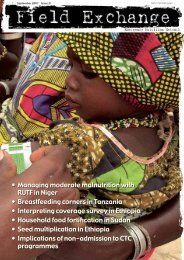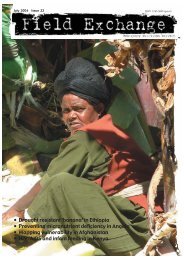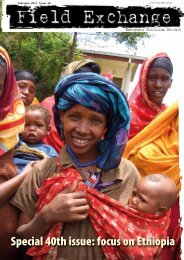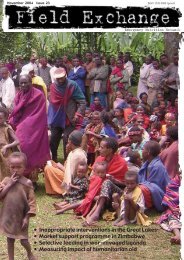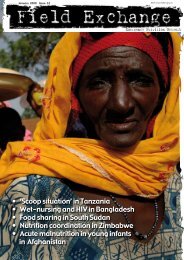Download PDF - Field Exchange - Emergency Nutrition Network
Download PDF - Field Exchange - Emergency Nutrition Network
Download PDF - Field Exchange - Emergency Nutrition Network
Create successful ePaper yourself
Turn your PDF publications into a flip-book with our unique Google optimized e-Paper software.
Agency Profile<br />
Name: Clinton Foundation<br />
Address:<br />
Email address:<br />
Website:<br />
55 West 125th Street, New York, NY<br />
10027<br />
sarora@clintonfoundation.org<br />
www.clintonfoundation.org<br />
Founded: 1970<br />
OTP centre located in a rural region several hours outside<br />
Addis Ababa, Ethiopia, supported by the Clinton Foundation.<br />
Director:<br />
No. of HQ staff<br />
No of staff worldwide<br />
(40 countries):<br />
Anil Soni, CEO<br />
4<br />
1,100 staff and volunteers<br />
Foundation HIV/AIDS Initiative (CHAI) is to<br />
increase access for HIV/AIDS care and treatment<br />
in the developing world through lowering<br />
prices for drugs, diagnostics and other<br />
commodities. When CHAI began in 2003, the<br />
ARV market was fragmented and suppliers were<br />
unable to take advantage of economies of scale<br />
and therefore, unable to lower the price of drugs.<br />
To address this, CHAI has worked to increase<br />
coordination between the demand and supply<br />
sides of the AIDS treatment market in order to<br />
catalyze significant price reductions for ARVs.<br />
Because ARV access for children has historically<br />
lagged far behind that of adults, CHAI<br />
began to focus on paediatric HIV treatment<br />
with the launch of its Paediatric Initiative in<br />
2005. This was effectively the entry point for<br />
CHAI’s work in nutrition, as the relationship<br />
between HIV and severe acute malnutrition<br />
(SAM) is so pronounced in many developing<br />
countries. The Foundation quickly came to<br />
realise that there are many strong linkages<br />
between SAM and HIV, and that in addressing<br />
SAM the quality of care for HIV treatment<br />
could be significantly improved. CHAI was<br />
subsequently chosen by UNITAID (a donor<br />
organisation supported by many national<br />
governments and seated within the World<br />
Health Organisation (WHO)) to be an implementing<br />
partner for a large scale donation of<br />
paediatric commodities. At CHAI’s request,<br />
RUTF was included in this donation with 25<br />
countries eligible to receive it. Since the inception<br />
of the UNITAID programme, CHAI has<br />
become the third largest purchaser of RUTF<br />
globally (behind UNICEF and Medecins sans<br />
Frontieres).<br />
CHAI has established memoranda of understanding<br />
(MOUs) with a number of governments<br />
to provide RUTF. Programme implementation<br />
support is offered via national governments<br />
in select countries where local partners<br />
are strong. CHAI-procured RUTF is used to<br />
treat SAM-affected children whether HIV positive<br />
or not. In countries where CHAI is offering<br />
programmatic support in addition to the donation<br />
of the product, this can include assistance<br />
with development of treatment protocols, offering<br />
forecasting and supply chain management<br />
support, supporting trainings and seconding<br />
staff, or clinical mentors for paediatric and<br />
CMAM facilities.<br />
The significant growth seen in the past year<br />
in RUTF production capacity has reduced the<br />
supply-side bottlenecks associated with the<br />
scale up of CMAM programmes. In CHAI’s<br />
experience, the stumbling block is now on the<br />
programmatic side, with a lack of capacity to<br />
implement CMAM. CHAI has been working<br />
closely with UNICEF and governments to identify<br />
implementing partners for CMAM and has<br />
been strongly advocating to get more funding<br />
for CMAM implementation and roll out.<br />
Another focus of CHAI’s work in RUTF has<br />
been in looking at whether price reductions for<br />
RUTF are possible. CHAI has conducted significant<br />
analyses of supplier cost structures to<br />
determine if there are areas where costs can be<br />
cut. These analyses have revealed that in<br />
general, RUTF suppliers are operating with<br />
slim margins and there is minimal potential for<br />
price reduction if the RUTF formulation<br />
remains unchanged. To address this, CHAI is<br />
working to generate funds for research into<br />
alternative formulations involving industry<br />
partners. Other supply side initiatives are<br />
centred on addressing concerns of new regional<br />
and local suppliers. CHAI have worked to form<br />
a consortium for purchasing milk powder,<br />
thereby cutting out intermediaries and extra<br />
costs, and has also mapped out solutions to<br />
other commonly faced barriers to market entry.<br />
CHAI is optimistic that as new products and<br />
new suppliers enter the market, prices will<br />
come down to a level that governments can<br />
eventually afford so that programmes become<br />
domestically sustainable.<br />
CHAI have endeavoured to strengthen<br />
government capacity to actually implement<br />
CMAM although with a growing evidence base<br />
of success in some countries, the political buy in<br />
is likely to increase demand and create sustainable<br />
resources and capacity for implementation.<br />
CHAI believe that decentralisation of CMAM to<br />
community level may be more challenging at<br />
this stage, but that with greater funding for HIV<br />
programming and home based care<br />
programmes, there is the potential for CMAM to<br />
piggy-back onto these existing programmes.<br />
This is already occurring in countries like<br />
Cameroon and Nigeria. Greater integration with<br />
Integrated Management of Childhood Illness<br />
(IMCI) will also help with decentralisation.<br />
The Clinton Foundation obtains funds from<br />
a number of foundations, private donors, and<br />
governments. President Clinton is still very<br />
involved in fund-raising and is an excellent<br />
spokesperson for the Foundation. As UNITAD<br />
funding for RUTF winds down over the coming<br />
years, CHAI has been working with agencies<br />
like PEPFAR, the Global Fund and others to<br />
ensure a smooth transition of CHAI RUTF<br />
procurements beyond the UNITAID<br />
programme. The Global Fund has begun to<br />
consider RUTF procurement in their grants, so<br />
funding for the commodity could become<br />
secure in the short-term. The Foundation is<br />
very aware of issues around RUTF supply<br />
sustainability and transition funding. For example,<br />
in Malawi where government is significantly<br />
decentralised and CMAM is being rolled<br />
out nationally, an agreement has been reached<br />
for each district to provide a certain percentage<br />
of resources for RUTF procurement. This<br />
percentage should increase each year by that<br />
percentage annually until most, if not all costs,<br />
are ultimately paid for by the districts.<br />
Both Seema and Rebecca see CHAI as<br />
unique in that it works on both the demand and<br />
supply sides of commodity marketplaces.<br />
Although CHAI began its work in RUTF as a<br />
procurement body with little intention of being<br />
‘hands-on’, it has had to roll up its sleeves and<br />
get involved in overseeing programme implementation<br />
in certain countries. This has necessitated<br />
forging strong relationships with government<br />
and often providing consultants and<br />
specialists seconded to government. CHAI has<br />
also supported government proposal writing to<br />
the Global Fund so that some programmes are<br />
now successfully funded.<br />
When asked about major gaps and challenges<br />
in the nutrition sector from a Clinton<br />
Foundation perspective, Seema and Rebecca<br />
cited a number of areas. The lack of comprehensive<br />
care for SAM children leading to fractured<br />
programme implementation is a big<br />
worry. This is caused by lack of funding for key<br />
implementation components, with the problem<br />
most pronounced in development rather than<br />
emergency settings. They also expressed<br />
concern about high default rates in outpatient<br />
therapeutic programme and supplementary<br />
feeding centre facilities, especially in urban<br />
areas, as well as weak monitoring and evaluation<br />
of these phenomena. In connection with<br />
this they wondered about the appropriateness<br />
of SPHERE standards in some contexts and<br />
whether there may be a need to re-think these.<br />
The Clinton Foundation has now grown into<br />
a global non-governmental organisation with<br />
1,100 staff and volunteers in more than 40 countries.<br />
Its rapid expansion and diverse funding<br />
sources suggests that the Foundation will<br />
continue to grow in scope and engagement. It<br />
will be fascinating to see how the Foundation<br />
chooses to engage with the humanitarian<br />
community, as well as how big a player it<br />
becomes.<br />
34



